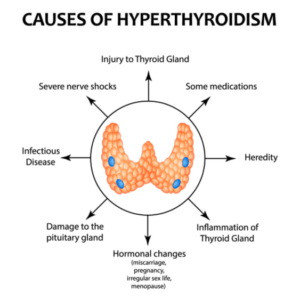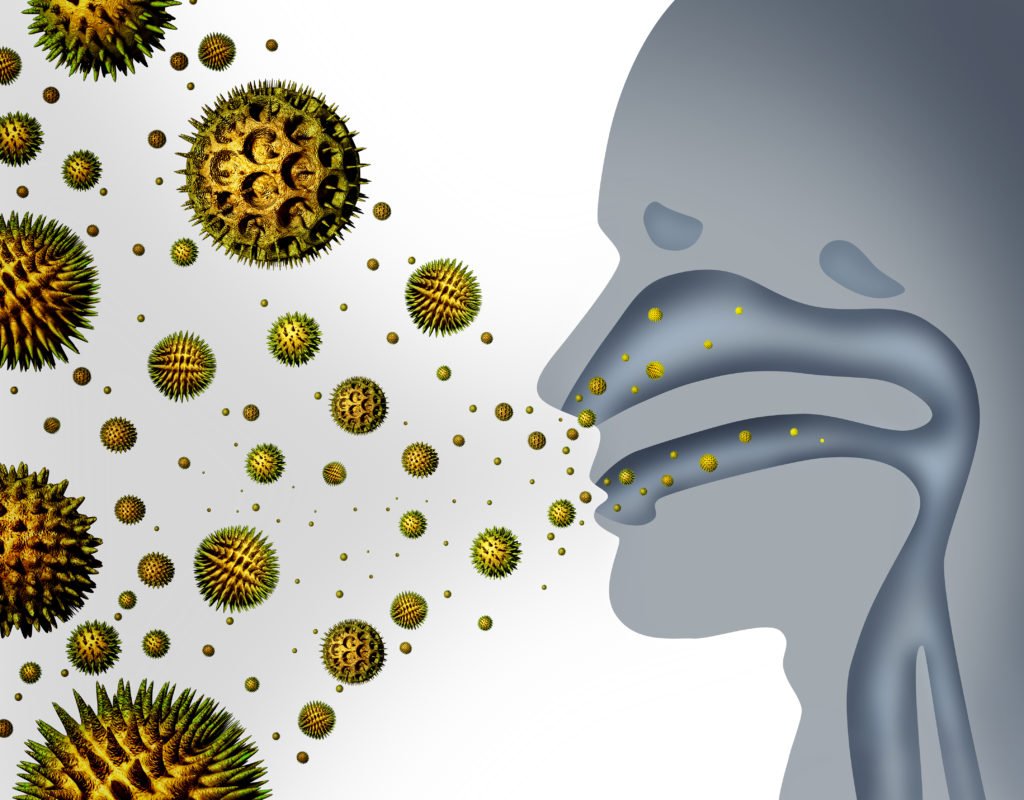Hyperthyroidism is the result of an over-functioning thyroid gland. The circulating T3 & T4 levels are high and TSH (Thyroid Stimulating Hormone) is low.

Causes
Graves disease is the most common cause of hyperthyroidism. Others include viral thyroiditis, excess dietary intake of iodine, overdose of thyroxine, functional thyroid adenoma and toxic multinodular goitre. Taking thyroid hormone as a health supplement should be discouraged and avoided in euthyroid individuals as it can cause life-threatening effects of hyperthyroidism such as cardiac failure, atrial fibrillation etc.
Duration and incidence of hyperthyroidism
Hyperthyroidism is a transient state of hyper-function of the thyroid gland. It doesn’t last longer than a few months. However, autoimmune thyroiditis (Grave’s disease) can be life long. More than 1 million cases of hyperthyroidism are diagnosed in India every year.
Symptoms
Common symptoms of hyperthyroidism are:
- Intolerance to heat
- Restlessness, irritability, nervousness, anxiety
- Tremors
- Increased appetite
- Weight loss
- Excessive sweating
- Brittle hair
- Frequent bowel movements
- Disturbed sleep
- Heavy menstrual flow
- Tachycardia – rapid heart rate
- Reduced attention span
- Confusion
- Thyroid swelling – goiter
- Low cholesterol
Hyperthyroidism in elderly
Irregular heartbeats and palpitation are seen in the elderly with hyperthyroidism. Very severe hyperthyroidism can present with delirium, confusion, fever, high blood pressure and congestive heart failure. Osteoporosis is another finding commonly seen in the older population with this condition.
Diagnosis
Blood tests for checking the level of T3, T4 and TSH can detect hyperthyroidism. Along with these tests, lipid profile will show low levels of cholesterol and LDL due to increased metabolism. Ultrasound of the neck is advised to detect changes in the thyroid tissue. Nuclear scans detect radioactive tracer uptake by the thyroid gland. MRI and CT scans of the brain are only advised when an advanced neck disease or a pituitary tumour is suspected.
Treatment
A hyperthyroid patient will have cardiac and cognitive dysfunction. These need to be addressed along with the primary cause of increased thyroid hormone production. Surgery, radio-iodine therapy and medications – all have a role to play.
Surgery
Surgical removal of the gland i.e. total thyroidectomy for a toxic multinodular goitre, hemithyroidectomy for a functional adenoma of the thyroid gland are a safe option for the treatment of hyperthyroidism in a select group of patients. This removed the gland in toto or partially and makes the patient hypothyroid. The hypothyroid patient can be easily treated with thyroxine supplementation. Complications of the surgery include voice change and injury to the parathyroid gland.
Radio-iodine(I-131) therapy
Radioactive Iodine is given orally to the patient, it is absorbed by the gut and concentrates in the thyroid. In the thyroid, radioactive Iodine (I-131) produces radiation that destroys the thyroid tissue, rendering the patient hypothyroid. The hypothyroid state is corrected by exogenous thyroxine supplementation.
Medications for hyperthyroidism
Anti-thyroid drugs:
Propylthiouracil, methimazole and carbimazole are the three anti-thyroid drugs approved for the treatment of hyperthyroidism. They belong to a group of drugs called thionamides. These are actively taken up by the thyroid cells and act by inhibiting the thyroid peroxidase enzyme, a key enzyme in the formation of thyroid hormone. They also have an immunosuppressive action important in treating the intrathyroidal inflammation seen in thyroiditis.
Beta-blockers
Thyroid hormones induce the expression of beta-adrenergic receptors in various tissues. Beta-blockers bind with these receptors and reduce the beta-adrenergic activity. These symptoms include – tremors, tachycardia, restlessness, palpitation, anxiety and heat intolerance.


